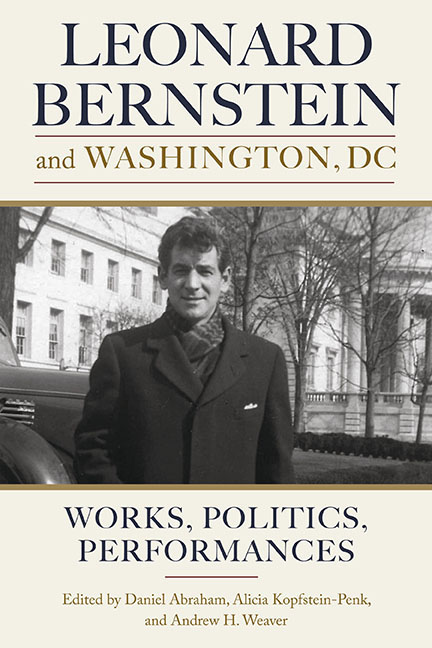2 - Bernstein and the White House
Published online by Cambridge University Press: 28 April 2020
Summary
Leonard Bernstein interacted in some way with nine presidents, Republicans and Democrats, during his lifetime (see table 2.1), serving most of them as a cultural icon and cultural ambassador. Presidents of both parties welcomed him or his music to the White House and occasionally invited him to significant events such as dinners with heads of state and the signing of bills. Unsurprisingly, his outspoken liberal stance infuriated conservative presidents. Almost half of the nine (mostly Republicans) did their best to avoid him, labeled him a communist, created and maintained a copious FBI file, tried to use the mechanism of government to destroy him, or casually dismissed him. Conversely, two Democrats had solid friendships with Bernstein. Stories of his intimate relationship with John F. Kennedy are wellknown, but he was also close with Jimmy Carter.
Presidential policies, then as now, profoundly influenced the American political and cultural landscape. Subtly or overtly, Bernstein commented on such issues, often in the nation's capital. This chapter lays the groundwork for the essays that follow by offering a study of Bernstein's interactions and relationships with these nine presidents and their wives (including his role as White House ambassador), a survey of Bernstein’s relevant compositions premiered during each president's administration, and a brief overview of the political, social, or cultural contexts during each administration that are germane to the following discussions (summarized in table 2.2).
Harry S. Truman (D), 1945–53
The first time Bernstein's orbit intersected that of the White House was during Truman's administration. One might expect positive interactions between Bernstein and this Democratic president, but the beginning of the Cold War and the Red Scare (1947–56) interfered. On the single occasion the president could have attended a performance by Bernstein, his staff engineered his absence. Truman firmly believed that Jews who had been persecuted by the Nazis should have a homeland where they could feel safe, and he therefore supported the founding of Israel. The president was to have attended a 1949 dinner honoring the first president of Israel, Chaim Weizmann, which culminated in performances by Bernstein (who was a first-generation Russian Jew), the violinist Jascha Heifetz (born a Russian Jew), and the NBC Symphony Orchestra.
- Type
- Chapter
- Information
- Leonard Bernstein and Washington, DCWorks, Politics, Performances, pp. 17 - 66Publisher: Boydell & BrewerPrint publication year: 2020



